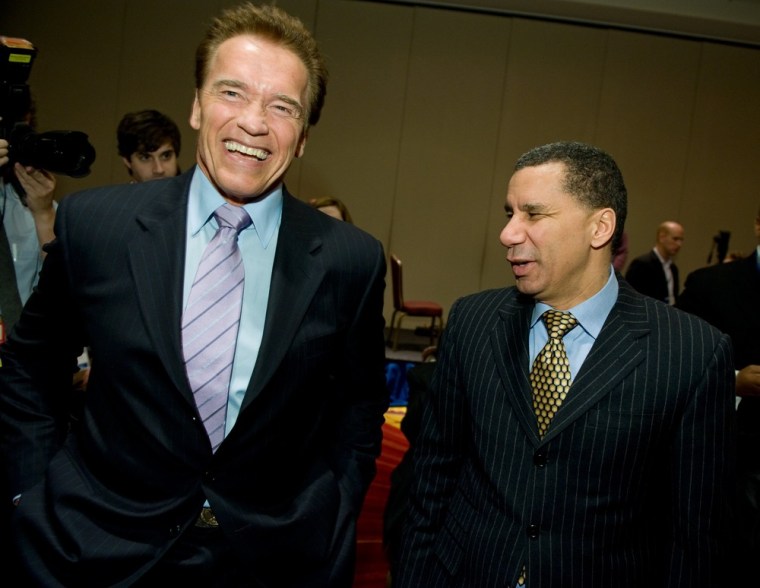Amid fierce angst about government spending, stubbornly high unemployment rates, and raging policy arguments over immigration and health care — being a member of Congress running for re-election can seem like one of the roughest jobs out there.
But try serving as governor.
Being one of the 50 chief executives right now is “the worst job in American politics,” says Jennifer Duffy, who tracks governors’ and senators’ races for The Cook Political Report.
Beginning Friday, governors from all over the country will convene in Boston, Mass., for their 102nd annual meeting. On the agenda at the National Governors Association meeting are discussions about implementing a tangle of new health care regulations; addressing the problem of expensive and overcrowded prisons; and easing the effects of a punishing financial downturn.
And, undoubtedly, the governors will engage in a little bit of commiserating too.
“The fiscal problems are just nasty,” said Ray Scheppach, the executive director of the NGA. “The hope is that 2011 is the bottom of it, but getting through this next year is going to be tough.”
For many of the governors’ states, the economic future looks dim. Forty-eight states faced budget shortfalls in 2010, and next year’s projected deficits add up to a whopping $140 billion, according to the non-profit Center on Budget and Policy Priorities. State and local governments have lost over 230,000 jobs over the past two years. Revenues have essentially flat-lined, forcing more than 30 states to take the unpopular step of raising taxes or fees since 2008 to fill the gap.
The biggest problem that governors and their state legislatures face, says Jon Shure of CBPP, “is the gap between people’s growing needs in the recession and the states’ abilities to meet those needs.” Social support programs, in other words, have to be slashed even as more hard-hit families are turning to them for help. Revenues aren’t expected to return to pre-recession levels until at least 2013.
All of that adds up to a gloomy job description for many of the states' top elected officials.
“If you’re a governor or a gubernatorial candidate, all you talk about is how to solve money problems,” says Duffy. “And there are no good solutions.”
Voters’ opinions of their elected officials often reflect their deflated wallets. The average approval rating for the governors of the nation’s ten most populous states hovers somewhere below the tepid 40 percent mark. Seven in 10 Californians disapprove of Gov. Arnold Schwarzenegger’s performance in the debt-saddled state. New York Gov. David Paterson’s numbers are almost as grim. Nevada Gov. Jim Gibbons, who was pummeled by scandals during his 42 months in office, became the state’s first executive to lose his job at the hands of a primary challenge last month. A recent Michigan State University poll showed its state’s governor, Jennifer Granholm, with a grade of “poor” from 40 percent of residents.
For about half of the governors who will gather on Friday, this annual meeting will be their last. Many, like Schwarzenegger and Granholm, are term-limited by state law. A handful of others who would have faced steep paths to re-election chose not to run again.
Of 37 governors’ races around the country this November, 23 feature no incumbent.
The influx of new blood next year makes this year’s planning for health reform changes even more important, Scheppach notes.
“It will be difficult for new governors to come in during a tough time when there’s going to be implementation of big new health care changes,” he said, adding that the NGA will hold extensive workshops for the members of the rookie class when they’re sworn in next year. “This is a handoff that’s going to be a challenging one.”
Still, many of the would-be newcomers to the elite club of American governors seem more than eager to enter the political pressure-cooker that awaits them.
GOP gubernatorial candidate Meg Whitman, running in California, spent a jaw-dropping $71 million of her own money during the primary campaign alone. Her Democratic opponent, Jerry Brown, is one of five former governors who have returned to the ballot to get another shot at their old job. One U.S. senator, Sam Brownback, gave up his seat to run for governor in his home state of Kansas; another, Sen. Kay Bailey Hutchison, would have done the same but was defeated in the Texas gubernatorial Republican primary.
Part of the reason is that the same things that make governors’ jobs difficult during bad times make their posts rewarding during good ones, experts say. Governors are often able to implement innovative new programs that would languish at the bottom of Congress’s priority list. A perk to some, but not all: statewide executive experience does not look shabby on the resume of a potential presidential candidate.
Still, says Duffy, "for the most part, these folks aren’t expecting it to be an easy or glamorous job. It’s the ultimate call to public service.”
